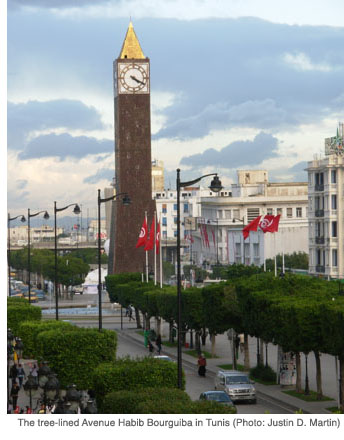Tunis, Tunisia—The first time I heard the word “Tunisia” was as a child watching The Cosby Show. In one episode, the show’s affable hero, Cliff Huxtable, tries to secure an original vinyl recording of Charlie Parker’s song, “Night in Tunisia.”
If Cliff Huxtable was enamored of it, Tunisia had to be a special place. When the episode was over I left the TV room to fetch my family’s globe. After some time, I located this small country squeezed into North Africa, and resolved to visit someday, even though the outpost was quite far from my hometown of St. Petersburg, Fla.
 I wouldn’t learn about Tunisia’s highly disturbing human rights record, though, until I was in college. Put simply, Tunisia was, and is, one of the worst places for political rights I could’ve eyed on my family’s globe—but many journalists have overlooked this. “News and analyses emanating from the Tunisian media and the foreign press…are always stunningly positive,” Arezki Daoud wrote in 2009 in Global Journalist. “When reading most, if not all, of the press reports from Tunisia, positive perceptions and upbeat statements dominate.”
I wouldn’t learn about Tunisia’s highly disturbing human rights record, though, until I was in college. Put simply, Tunisia was, and is, one of the worst places for political rights I could’ve eyed on my family’s globe—but many journalists have overlooked this. “News and analyses emanating from the Tunisian media and the foreign press…are always stunningly positive,” Arezki Daoud wrote in 2009 in Global Journalist. “When reading most, if not all, of the press reports from Tunisia, positive perceptions and upbeat statements dominate.”
When Tunisia’s current president, Zine el-Abidine Ben Ali, was elected to a fifth term in 2009 with nearly 90 percent of the vote, USA Today didn’t question the incumbent’s legitimacy other than to say Ali’s opponents were “largely cosmetic.”
One New York Times piece observed that “Tunisia is known for its golden beaches, sunny weather, and affordable luxuries.” Yes, it is, thanks to reporting like this. To be fair, this was written in a New York Times travel blurb. Still, Freedom House assigns Tunisia roughly the same overall human rights score as Zimbabwe and Iran. I doubt that a Times travel clip on Iran would omit all mention of political suppression.
Gilded beaches aren’t the only distractions that have led journalists to give the Tunisian regime a pass. The country’s economy is a non-oil-driven success story in the Arab world and the country is routinely listed as the Arab leader on women’s rights, positives that deserve praise. Tunisia banned polygamy fifty-four years ago, while other mostly progressive Arab nations like Jordan and Egypt still embrace the practice in the twenty-first century. Tunisia scores the highest of any non-oil-blessed Arab nation on the 2010 U.N. Human Development Index.
And yet the country’s record on free speech and political rights is abysmal. Publicly criticizing President Ben Ali can lead to persecution and imprisonment. Opposition parties are almost nonexistent, and elections are structured to give every possible advantage to the entrenched powers. As Freedom House reports: “The government’s efforts to control the 2009 election process were evident in restrictions imposed on the media, retaliation against journalists and bloggers, and a concerted bid by official media to discredit critical coverage.”
As you might expect, Tunisia is one of the worst places on earth for journalists. Dissident voices can face surveillance, harassment, imprisonment, deportation, and more. Reporters without Borders lists the country as among the world’s twelve worst repressors of Internet speech (I’d provide you the link to this information, but the Tunisian government blocks websites of Freedom House, Committee to Protect Journalists, Reporters without Borders, and other human rights advocates. Expecting as much, I brought dozens of reports on Tunisia’s human rights record with me on a flash drive—a device that is less likely to be found and searched by police than a laptop). The Tunisian government began blocking YouTube in 2007 and, as of this writing, still does.
There is no guarantee that the situation would improve if outside journalists paid it more attention. “[A]n editorial in The New York Times or Washington Post [used to be] enough to mobilize public opinion against repressive governments,” Mort Rosenblum wrote in his thoughtful book, Little Bunch of Madmen. “Now bringing pressure is far more complex.” There is some truth to this. I live in Egypt, ruled by a regime which recently accelerated its stampede atop journalists just before parliamentary elections, and the Mubarak machine smugly ignored outside editorial objections.
Still, the unexamined dictatorship never changes. An observable pattern in economics is that if you subsidize a certain behavior, you get more of the same. This is also true in journalism; heap fondness or inattention on a crooked regime, and it’s likely to maintain or intensify its grip. Too many journalists have subsidized Tunisia with coddling coverage of its economic success, gleaming shores, and espresso-scented sidewalks. It’s tempting, I know. I’m writing on a sunny hotel balcony overlooking a street that could be Rome’s.
But this is the Bill Cosby version of Tunisia, not the unvarnished one, and the people that live in the real Tunisia deserve more critical eyes on their handlers.
Justin D. Martin is a journalism professor at Northwestern University in Qatar. Follow him on Twitter: @Justin_D_Martin
